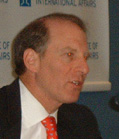Bush Administration Generates Anti-American Sentiment in Europe
The Honorable Dr. Richard Haas (President, Council on Foreign Affairs, New York and former Head of Policy Planning Staff, US Department of State)
J. Sean Curtin(Fellow, GLOCOM and Asia Times)
Background

In the first US presidential debate, the Iraq conflict and US foreign policy dominated the agenda. Various global opinion surveys have shown that as a result of the Iraq conflict the European and worldview of the United States has become more negative. Basically, since the Bush administration took office, it has generated a steadily growing tide of anti-Americanism.
For example, an extensive 11-country study conducted in 2003 found that 40% of the sample had an unfavourable view of the United States, while only 50% expressed a fairly or very favourable opinion. Additionally, 57% of the same sample had either a very unfavourable or fairly unfavourable attitude towards President George W. Bush.
More recently, an opinion survey of 35 nations released in September 2004 showed that 30 of the countries would prefer to see Senator John Kerry win the next US presidential election, ousting George W. Bush. Only three nations were in favour of the Bush administration continuing in office.
President Bush's time in power has witnessed a noticeable rise in ant-American sentiment across Europe, something which troubles many American foreign policy experts.
Sean Curtin: Some commentators say that current US policy seems specifically designed to make the US as unpopular as possible in Europe and the Arab world. What concrete steps can the US take to change this perception?
Richard Haas: Anyone who would suggest that the United States is trying to make our policy more unpopular – I have only been in the UK a few hours – that is the oddest thing I have heard.
Sean Curtin: Well, there is definitely a very strong wave of anti-Americanism in Britain. You just have to read a newspaper, most of which are very critical of the United States.
Richard Haas: I understand that and am fully sensitive to the scope and intensity of the anti-Americanism having been on the receiving end of quite a bit, both personally and professionally over the last few years. All I am trying to say is that the United States in no way sees it as desirable or beneficial. No way do I believe that anyone is trying to generate that or takes satisfaction from it. It is an unfortunate development.
There is a debate going on in the United States about the price the United States has got to pay for it…I do think we pay a price for it. What is it we do about it?...Well, to the extent that it is down to questions of the style and tone of American foreign policy, that can be corrected and should be.
Diplomacy is an important dimension of foreign policy and to the extent of what could be done too, if you will, when we disagree. We must regard these issues in as calm a way as possible…I do not think that it is enough for the United States to simply say we disagree. I think we also have to put forward an alternative.
I think that the United States would have been wiser to have suggested or developed a more comprehensive alternative to Kyoto rather than simply stressing the imperfections of the agreement that was being put forward by others. I think that all of this will help.
I also think that some of the disagreements are fundamental about specific policies. When that happens, as I have suggested, we are going to have to find ways to reach agreement. It is impossible to devise in Europe, American and European policies that are going to be wholly consonant. It is not going to happen.
The above discussion took place at the Royal Institute of International Affairs in London on 1 June 2004
Related Articles
Anglo-American Ties Difficult but Essential
Europe Report #103, 21 September 2004
World Opinion Poll Shows Little Support For Bush Re-Election
Barry Newhouse, Associated Press, 8 September 2004
Poll Suggests world hostile to US
BBC News, 16 June 2003
World's view of America worsens
International Herald Tribune, 19 March 2003
If the world could vote, it's Kerry in a landslide
Jim Lobe, Asia Times, 9 September 2004
Is the Iraq Conflict still Polarizing World Politics?
Europe Report #98, 23 July 2004
Japanese Anti-War Sentiment on Iraq in Accord with Global Opinion
J. Sean Curtin, Social Trends: Series #28, GLOCOM Platform, 24 February 2003
Iraq Anniversary in Europe – Part One: Iraq War has Little Support in Europe
J. Sean Curtin, Europe Report #74, 24 March 2004
Japanese Public Opinion on the Second Iraq War – Part Five: Postwar Opinions about the Iraq Conflict
Social Trends: Series #50, GLOCOM Platform, 29 July 2003
Japanese Anti-War Sentiment Reaches New Heights
Social Trends: Series #29, GLOCOM Platform, 5 March 2003
Is America a better place to live?
BBC News, 16 June 2003
| 




